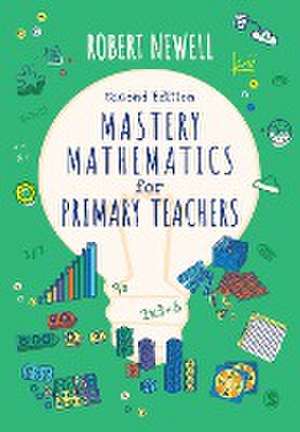Mastery Mathematics for Primary Teachers
Autor Robert Newellen Limba Engleză Paperback – 10 mai 2023
| Toate formatele și edițiile | Preț | Express |
|---|---|---|
| Paperback (1) | 218.44 lei 3-5 săpt. | +21.44 lei 4-10 zile |
| SAGE Publications Ltd – 10 mai 2023 | 218.44 lei 3-5 săpt. | +21.44 lei 4-10 zile |
| Hardback (1) | 501.28 lei 3-5 săpt. | +26.95 lei 4-10 zile |
| SAGE Publications Ltd – 10 mai 2023 | 501.28 lei 3-5 săpt. | +26.95 lei 4-10 zile |
Preț: 218.44 lei
Nou
Puncte Express: 328
Preț estimativ în valută:
41.80€ • 43.38$ • 34.94£
41.80€ • 43.38$ • 34.94£
Carte disponibilă
Livrare economică 25 februarie-11 martie
Livrare express 08-14 februarie pentru 31.43 lei
Preluare comenzi: 021 569.72.76
Specificații
ISBN-13: 9781529792188
ISBN-10: 1529792185
Pagini: 280
Dimensiuni: 170 x 244 x 15 mm
Greutate: 0.45 kg
Ediția:2. Auflage
Editura: SAGE Publications Ltd
ISBN-10: 1529792185
Pagini: 280
Dimensiuni: 170 x 244 x 15 mm
Greutate: 0.45 kg
Ediția:2. Auflage
Editura: SAGE Publications Ltd
Notă biografică
Robert Newell has worked at the Institute of Education (IOE) for 17 years; full time for the last eight. He works with Primary PGCE (Postgraduate Certificate in Education) trainees and Teach First participants. His career started as a primary school teacher, taking responsibility in maths in several schools before progressing to two deputy head posts and then a headteacher role.
Primary maths teaching, though, has been his biggest passion. He has worked as a numeracy consultant and also delivered a PGCE Maths programme to a London SCITT (School-Centred Initial Teacher Training centre) for three years. He is now part of a small maths team serving several hundred trainees at the IOE, now merged with UCL (University College London). He has two passions that underpin his work. One is ensuring that primary maths children are taught in a way that engages them and focuses on understanding. The other is the belief that, in the main, it is only anxiety that stops more trainees feeling comfortable about teaching maths. Part of his working role at the IOE is linked to supporting trainees with less secure understanding and allowing them to see how much they can offer. Many realise that although anxiety has affected their self-perception about mathematical understanding, this process can be reversed.
His dissertation focused on the different ways trainee teachers can learn to use different levels of understanding effectively in their primary school maths teaching. His writing and work in recent years have focused primarily on empowering trainees and new teachers to fulfil their potential whatever their disposition is or their journey has been. Here, he commits to print a range of ideas and activities, refined over many years and linked to ensuring all primary teachers can teach for understanding. In this edition, his recent work in analysing the mastery approach to teaching maths supports the articulation.
Primary maths teaching, though, has been his biggest passion. He has worked as a numeracy consultant and also delivered a PGCE Maths programme to a London SCITT (School-Centred Initial Teacher Training centre) for three years. He is now part of a small maths team serving several hundred trainees at the IOE, now merged with UCL (University College London). He has two passions that underpin his work. One is ensuring that primary maths children are taught in a way that engages them and focuses on understanding. The other is the belief that, in the main, it is only anxiety that stops more trainees feeling comfortable about teaching maths. Part of his working role at the IOE is linked to supporting trainees with less secure understanding and allowing them to see how much they can offer. Many realise that although anxiety has affected their self-perception about mathematical understanding, this process can be reversed.
His dissertation focused on the different ways trainee teachers can learn to use different levels of understanding effectively in their primary school maths teaching. His writing and work in recent years have focused primarily on empowering trainees and new teachers to fulfil their potential whatever their disposition is or their journey has been. Here, he commits to print a range of ideas and activities, refined over many years and linked to ensuring all primary teachers can teach for understanding. In this edition, his recent work in analysing the mastery approach to teaching maths supports the articulation.
Cuprins
Chapter 1: The Context For Mathematics Teaching
Chapter 2: What Is Mastery Teaching At Primary Level?
Chapter 3: Key Terms And Features Of Mastery Teaching
Chapter 4: Manipulatives: Their Purpose And Use In A Mastery Approach To Teaching
Chapter 5: Planning For Small-Step Progression
Chapter 6: Mastery In The UK
Chapter 7: Teaching For Mastery
Chapter 8: Planning And Schemes Of Work
Chapter 9: Variation In Teaching Theory And Practice
Chapter 10: School Models For Teaching Mastery
Chapter 11: Assessment And Mastery
Chapter 12: Early Years Mastery
Chapter 2: What Is Mastery Teaching At Primary Level?
Chapter 3: Key Terms And Features Of Mastery Teaching
Chapter 4: Manipulatives: Their Purpose And Use In A Mastery Approach To Teaching
Chapter 5: Planning For Small-Step Progression
Chapter 6: Mastery In The UK
Chapter 7: Teaching For Mastery
Chapter 8: Planning And Schemes Of Work
Chapter 9: Variation In Teaching Theory And Practice
Chapter 10: School Models For Teaching Mastery
Chapter 11: Assessment And Mastery
Chapter 12: Early Years Mastery
